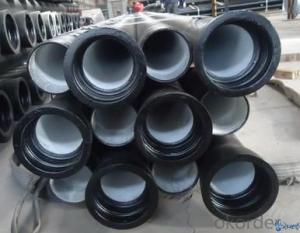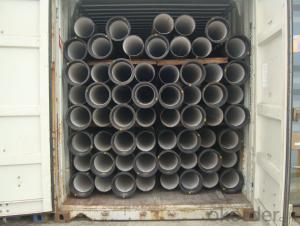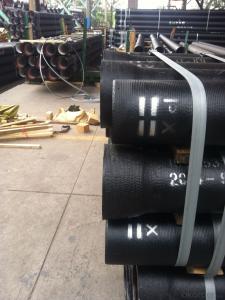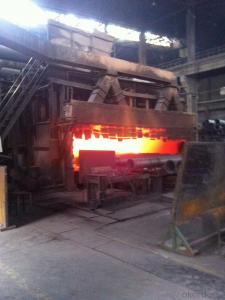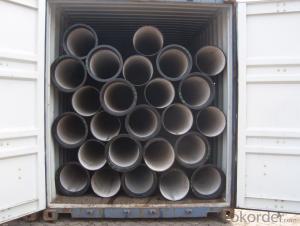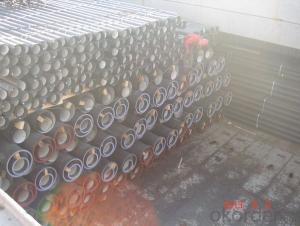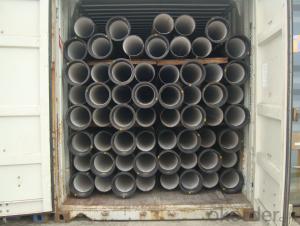DUCTILE IRON PIPES AND PIPE FITTINGS K8CLASS DN1000
- Loading Port:
- Tianjin
- Payment Terms:
- TT OR LC
- Min Order Qty:
- 22 pc
- Supply Capability:
- 3000 pc/month
OKorder Service Pledge
OKorder Financial Service
You Might Also Like
Material : Ductile Cast Iron
Size Range : DN 80mm to DN 2000mm
Unit Effective Length : 6m or 5.7m
Manufacture Standard: ISO 2531:1998/ EN 545:2006/EN 598:2007
Annual capacity : 200,000 tons
Coating Exterior: Zinc 130g/m2 according to ISO 8179-1 and bitumen coating 70 microns.
Cement Interior: Portland Cement/ High Alumina Cement/ Sulphate Resisting Cement Lining according to ISO 4179
Special requirements on external coating and internal lining can be applied
We also provide accessories such as SBR/EPDM rubber gaskets, lubricant paste, pipe caps, PE sleeves, etc.
Additional Parts:
Each pipe is strictly inspected according to related standard to ensure permanently high performance.
Easy Installation at site and service free for life
Long Service Lifespan
Quotation will arrive you within 24hours once we get your inquiry.
We guarantee offering you a competitive price.
A copy of original inspection reports of pipes will be offered after shipment.
Photos of loading process will be sent to the customer after shipment effect.
We will follow-up the delivery progress after shipment effect and update to the customer on weekly basis.
- Q: Can ductile iron pipes be used for irrigation systems in saline soil conditions?
- Yes, ductile iron pipes can be used for irrigation systems in saline soil conditions. Ductile iron pipes have excellent corrosion resistance properties, making them suitable for use in saline environments. However, it is important to consider the specific requirements and consult with experts to ensure proper selection and installation methods are implemented for optimal performance and durability in such conditions.
- Q: Can ductile iron pipes be used in areas with high soil acidity?
- Ductile iron pipes can be used in areas with high soil acidity, but certain precautions should be taken to ensure their longevity and performance. Ductile iron pipes are known for their strength, durability, and resistance to corrosion, which makes them suitable for various soil conditions, including those with high acidity. However, high soil acidity can still pose a potential risk to ductile iron pipes over time. Acidic soils can accelerate the corrosion process, potentially leading to the degradation of the pipe material. To mitigate this risk, several measures can be implemented: 1. Protective Coatings: Applying protective coatings to the outer surface of the ductile iron pipes can provide an extra layer of defense against soil acidity. These coatings, such as epoxy or polyethylene, act as a barrier, preventing direct contact between the pipe and the corrosive soil. 2. pH Adjustment: Adjusting the pH levels of the soil can help reduce its acidity. This can be done by adding lime or other neutralizing agents to the soil, which will help create a more favorable environment for the ductile iron pipes. 3. Cathodic Protection: Implementing cathodic protection systems can be an effective method to prevent corrosion in ductile iron pipes. This technique involves the use of sacrificial anodes or impressed current systems to create a protective electrical current that counteracts the corrosive effects of the soil. 4. Regular Inspections: Periodic inspections should be conducted to monitor the condition of the ductile iron pipes in areas with high soil acidity. This allows for early detection of any corrosion or degradation, enabling timely repairs or replacements to be carried out. By implementing these measures, ductile iron pipes can be effectively used in areas with high soil acidity, ensuring their long-term performance and minimizing the risks associated with corrosive soils. However, it is always recommended to consult with experts or engineers familiar with local soil conditions and the specific requirements of the project to determine the most suitable materials and protective measures.
- Q: The difference between HDPE pipe and ductile iron pipe
- Different appearance, ductile iron pipe single length of 6 meters, large wall thickness; mechanism cast iron pipe single length of 3 meters, the wall thickness is thin.
- Q: Can ductile iron pipes be used for bridge drainage systems?
- Indeed, bridge drainage systems can make use of ductile iron pipes. Ductile iron, a resilient material, finds widespread use in numerous applications, such as water and sewage systems, owing to its strength and durability. With exceptional resistance to corrosion, it is capable of enduring substantial loads and pressure, rendering it an ideal choice for bridge drainage systems. Moreover, the smooth inner surface of ductile iron pipes facilitates efficient water flow, preventing the occurrence of clogs and blockages. Therefore, given their robustness, longevity, and capacity to handle the necessary water flow, ductile iron pipes prove to be a fitting option for bridge drainage systems.
- Q: What are the different methods for anchoring ductile iron pipe?
- There are several methods for anchoring ductile iron pipe, including thrust blocking, concrete encasement, pipe restraints, and thrust collars.
- Q: What is the expected fatigue life of ductile iron pipes under cyclic loading?
- The expected fatigue life of ductile iron pipes under cyclic loading can vary depending on various factors such as the magnitude and frequency of the cyclic loading, the quality of the material, the design and installation of the pipes, and the environmental conditions. Ductile iron is known for its high strength and ductility, which enables it to withstand cyclic loading to a certain extent. However, like any other material, it is also susceptible to fatigue failure over time. To estimate the expected fatigue life of ductile iron pipes, engineers often utilize fatigue analysis and testing methods. These methods involve subjecting representative samples of the pipes to cyclic loading under controlled conditions and measuring the number of cycles required for failure to occur. The results of these tests are then used to extrapolate the expected fatigue life of the pipes under similar loading conditions. It is important to note that the expected fatigue life can vary significantly depending on the specific conditions and loading patterns experienced by the pipes in a given application. Therefore, it is crucial to consider factors such as the operational demands, maintenance practices, and the overall structural integrity of the pipeline system. Additionally, the use of appropriate design standards and guidelines, along with regular inspection and maintenance, can help enhance the fatigue life of ductile iron pipes. In summary, while it is challenging to provide a specific value for the expected fatigue life of ductile iron pipes under cyclic loading, engineers can estimate it through fatigue analysis and testing methods. It is essential to consider various factors and maintain the pipes properly to ensure their longevity and prevent potential failures.
- Q: Are ductile iron pipes suitable for use in chemical processing plants?
- Yes, ductile iron pipes are suitable for use in chemical processing plants. Ductile iron is known for its high strength and durability, making it resistant to corrosion and capable of withstanding high pressure and extreme temperatures. Additionally, its smooth internal surface reduces friction and allows for efficient flow of chemicals.
- Q: Can ductile iron pipes be used for high-pressure applications?
- Ductile iron pipes are capable of being utilized in high-pressure scenarios. This material, known for its strength and durability, can endure substantial pressure and loads. Its exceptional mechanical properties, such as its high tensile strength and impact resistance, make it ideal for a variety of uses, including water and wastewater systems, oil and gas pipelines, and industrial processes. Furthermore, ductile iron pipes possess a remarkable resistance to corrosion and abrasion, further bolstering their suitability for high-pressure environments. Nonetheless, it is crucial to consider the specific requirements and design factors of the application to ensure that the ductile iron pipes meet the necessary standards and specifications for the desired pressure range.
- Q: What is the average cost of ductile iron pipe?
- The average cost of ductile iron pipe can vary depending on several factors such as the diameter, length, and thickness of the pipe, as well as the supplier and location. On average, however, ductile iron pipe can range from approximately $40 to $200 per linear foot. It is important to note that these prices are estimates and can fluctuate based on market conditions and other variables. It is recommended to contact local suppliers or distributors for specific pricing information tailored to your project requirements.
- Q: Is there a kind of pipe called lined ductile iron pipe? Seeking manufacturers?
- Yes, ductile pipe is divided into two kinds, one is the ductile cast iron pipe pipe socket (socket ductile pipe), which is mainly used for water supply system, namely the fire water, because of ductile iron pipe with pressure, 10kg, 12kg, 16kg. Pressure small price, a few cheaper, because pure in the production process of different, 1. sand mill 2. metal water cooling, like water, the basic is 16kg.
Send your message to us
DUCTILE IRON PIPES AND PIPE FITTINGS K8CLASS DN1000
- Loading Port:
- Tianjin
- Payment Terms:
- TT OR LC
- Min Order Qty:
- 22 pc
- Supply Capability:
- 3000 pc/month
OKorder Service Pledge
OKorder Financial Service
Similar products
Hot products
Hot Searches
Related keywords
